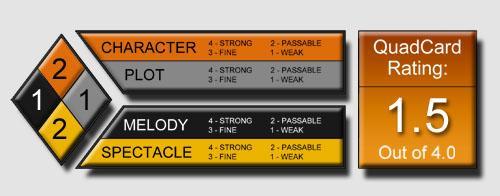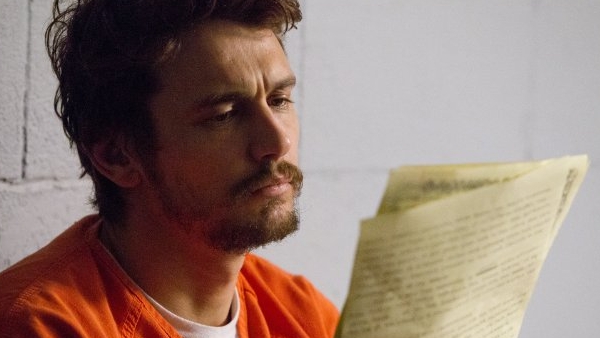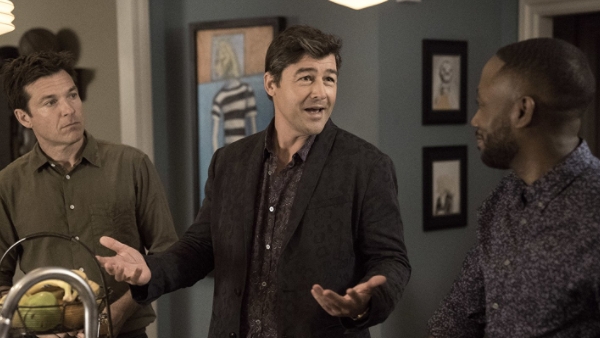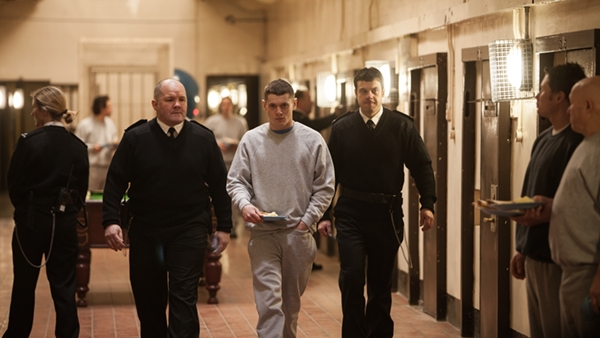 We’re living in a time when the phrase “unfilmable novel” can no longer serve as an excuse for poor page-to-screen adaptations of quintessential stories on the receiving end of the Hollywood treatment. Over a decade ago, Peter Jackson shouldered the burden of that challenge by taking J.R.R. Tolkien’s Lord of the Rings books and turning them into a trilogy of three hour and change films (or one ten hour film, depending on your perspective) whose joint success led to criminal cultural misuse of the word “epic”; nobody can so cavalierly write off their inept filmmaking based on a text’s inclination toward being transposed onto celluloid. It’s a blatant cop-out.
We’re living in a time when the phrase “unfilmable novel” can no longer serve as an excuse for poor page-to-screen adaptations of quintessential stories on the receiving end of the Hollywood treatment. Over a decade ago, Peter Jackson shouldered the burden of that challenge by taking J.R.R. Tolkien’s Lord of the Rings books and turning them into a trilogy of three hour and change films (or one ten hour film, depending on your perspective) whose joint success led to criminal cultural misuse of the word “epic”; nobody can so cavalierly write off their inept filmmaking based on a text’s inclination toward being transposed onto celluloid. It’s a blatant cop-out.
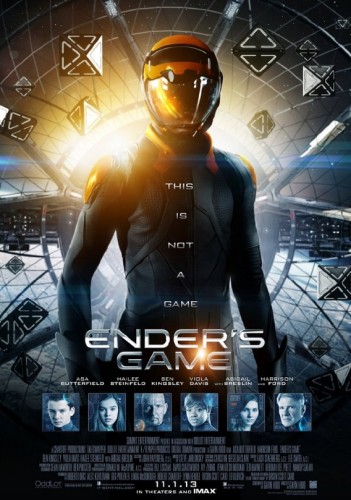 Which means that no matter what Gavin Hood’s supporters have to say, his interpretation of Orson Scott Card’s Ender’s Game is a near-disaster because he made a bad movie. Granted, Card’s classic science fiction tome is a rather tricky beast to transform into a series of moving pictures; for all of its action-oriented stretches, the majority of the narrative unfolds in the mind of its protagonist. How does anybody turn thought into a product that’s suitably palatable for both a mainstream audience and for sci-fi diehards alike when they’re attending for very different reasons? The former looks for CG spectacle, the latter for the more cerebral pleasures of Card’s excellent book; that’s a delicate balancing act to manage, and one that Hood fails to maintain in dramatic fashion.
Which means that no matter what Gavin Hood’s supporters have to say, his interpretation of Orson Scott Card’s Ender’s Game is a near-disaster because he made a bad movie. Granted, Card’s classic science fiction tome is a rather tricky beast to transform into a series of moving pictures; for all of its action-oriented stretches, the majority of the narrative unfolds in the mind of its protagonist. How does anybody turn thought into a product that’s suitably palatable for both a mainstream audience and for sci-fi diehards alike when they’re attending for very different reasons? The former looks for CG spectacle, the latter for the more cerebral pleasures of Card’s excellent book; that’s a delicate balancing act to manage, and one that Hood fails to maintain in dramatic fashion.
Nothing here works. The action doesn’t live up to even the most middle-ground set pieces in this year’s slate of blockbusters; the storytelling and thematic “stuff” of Card’s narrative hits with a resounding thud. For the uninitiated, Ender’s Game takes place in a distant future where mankind has clawed back from the brink after barely winning a war with an insectoid alien race known as the Formic (“buggers” in the novel, a term that’s not once used in the film, undoubtedly for reasons of PC sensitivity). In the present, the world lives in fear of an inevitable rematch with the creatures; to that end, military efforts toward repelling a future attack (with preemptive aggression) focus on turning children into brilliant tactical minds and putting them at the helm of the world’s armies.
That’s where our titular hero, Andrew “Ender” Wiggin (Asa Butterfield) comes in. He’s the best, brightest, most ruthless kid to go through Battle School – we know this because the film takes care to remind us at every available opportunity. Sometimes, it does so through showing; Ender beats down a much larger schoolmate very early on, to ensure that he’s never picked on again. Sometimes, in fact more often than not, it does so by telling, and two hours filled with incessant speechifying about Ender being “the one” gets real old, real fast. Ender, according to the three hundred pages Card dedicated to fleshing out his tale in the original novel, isn’t the best because adults say so; he’s the best because he simply is.
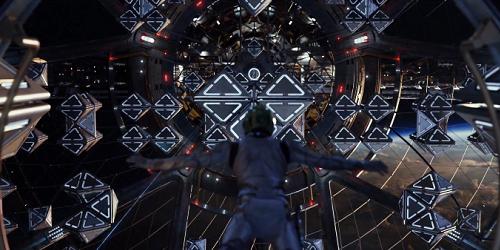
We don’t get the privilege of seeing his development into messianic war commander play out in even a remotely organic manner, though admittedly the scenes of zero gravity laser tag are pretty fun. There’s no sense of learning or growing. Ender’s Game hurtles from one moment to the next, barely germinating the scantest connective tissue to bind each scene together in sequence; they’re only related because they take place in the same environments and feature the same characters. Put another way, the film plays in the most rote way possible – this is CliffNotes level stuff, capable of conveying a basic sense of cohesion but ill-equipped to mine the inherent value out of Card’s words. You’ll understand what’s happening, but you probably won’t give a damn.
Part of the issue here is that Ender’s Game puts so much emphasis on the thought stream of a young boy. What about that is cinematic? Hood solves that quandary by siphoning everything out of Ender’s head and having it spoken aloud; by doing this, though, he just creates more problems for himself, because compelling inner musings don’t necessarily translate into compelling dialogue. Ender’s Game doesn’t quite end up becoming Exposition: The Movie, but it’s close enough to be frustrating, especially in light of the film’s tendency to shamelessly, needlessly recycle conversations between its cast of characters. Card at least knew how to re-contextualize Ender’s ethical struggles from chapter to chapter, turning each bout of morality into an evolving conversation rather than pat restatements of previously explored concepts.
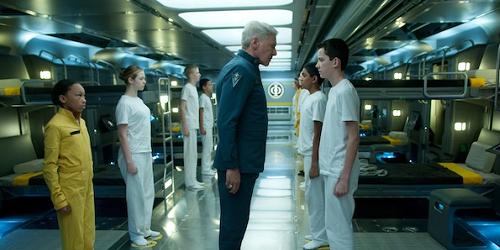
Maybe none of this would be as big a deal if Ender’s Game had a single noteworthy performance to savor. There’s certainly enough talent on display to give the gambling types in the audiences decent odds on picking a winner; a huge chunk of the cast is comprised of people who have either been in Academy-level films or who have themselves won or been nominated for Oscars. Yet everybody here appears to be operating on auto-pilot. Even reliable vets like Ben Kingsley, playing a legendary hero from Earth’s first clash with the Formics, and Harrison Ford, playing hard-nosed school teacher and military leader Colonel Graff (Gruff?), don’t eke out any memorability from their screen time. (Viola Davis, giving the film its bleeding heart, is given literally nothing important to do.) Butterfield avails himself well, outside of one of 2013’s worst line readings, and Hailee Steinfeld – enjoying her slightly expanded role at the expense of Abigail Breslin’s vastly reduced role – does fine, too. But you probably won’t remember them once you’ve left the theater.
G-S-T Ruling:
That’s probably the best way to sum up your experience with Ender’s Game in total: wholly forgettable. If any kind words need be spoken here, they’re all about aesthetic – the film looks quite pretty, with a reasonable amount of care being placed upon aesthetics if not comprehensibility. But that just means Hood deserves a reasonable share of credit for making a decent video game, and much less for making a competent movie. Kudos to him and to Hollywood for having the audacity to get this thing made in the first place, but material this smart and this important demands to be backed by more than just chutzpah: it needs real passion and talent, too.
